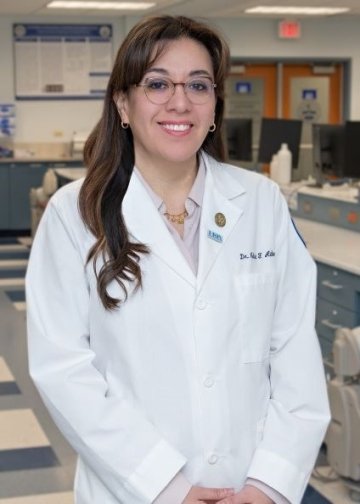
"The most rewarding part of being a member of MWU faculty is the friendly community and the creative, excellent, and inspiring atmosphere that allows me to thrive professionally, as well as the students in their respective health care professions."
How long have you been at Midwestern University?
3 years (joined in July 2021)
What are your research interests?
Schistosomiasis remains a significant public health problem with 400-600 million people currently infected worldwide, and an additional 800 million people at risk of infection. Schistosomiasis is a neglected tropical disease caused by infections with parasitic blood flukes (helminths) commonly referred to as schistosomes. The three main clinically relevant species are Schistosoma mansoni (hepatic/intestinal schistosomiasis), S. haematobium (urogenital schistosomiasis) and S. japonicum, a zoonosis responsible for hepatic/intestinal schistosomiasis. My research interests fall under the broad category of host-parasite interactions. Specifically, my research is focused on two areas:
- Understanding the mechanisms employed by schistosomes/blood flukes (parasitic helminths) to evade their host immune responses and
- Systematic development of effective schistosomiasis vaccines. Using conventional and novel technologies, we seek to functionally characterize key parasite factors involved in host immune evasion thereby increasing our understanding of the parasite biology and identification of novel vaccine candidates.
Using systems vaccinology approaches, we utilize immunization as a way to probe the host immune system in a synchronized fashion and the effects on the immune system studied at various time points. This approach provides the platform to identify "immune signatures" associated with vaccine-mediated protection, separate vaccines into responders and non-responders, with the potential to reveal important mechanistic insights through translational vaccine trials to aid in the expedited design of future vaccines.
What is the most rewarding part of being a member of the Midwestern University faculty?
The most rewarding part of being a member of MWU faculty is the friendly community and the creative, excellent, and inspiring atmosphere that allows me to thrive professionally, as well as the students in their respective health care professions.
How do you engage students in the learning process?
My instruction approach is active learning (student-centered approach), which allows students to enthusiastically participate in their learning process. Some of my specific strategies include question-and-answer sessions, discussions, interactive lectures, quick writing assignments, and experiential learning.
What do you hope students learn from your classes?
In a nutshell, my hope for the students in my classes is to successfully achieve the course’s learning objectives.
What lessons would you like students to take with them in their professional careers?
To always keep learning and share their learning experiences with others. One of my favorite quotes is, “There is in fact no teaching without learning. One requires the other and the subject of each, despite their obvious differences, and cannot be educated to the status of the object. Whoever teaches learns in the act of teaching, and whoever learns, teaches in the act of learning.” -Paulo Freire
What about your profession should people know more about?
In my profession as a basic science researcher and a medical educator, we play a crucial role in health care transformation by preparing students to meet future patient care needs and lead change in the emerging clinical environment.



